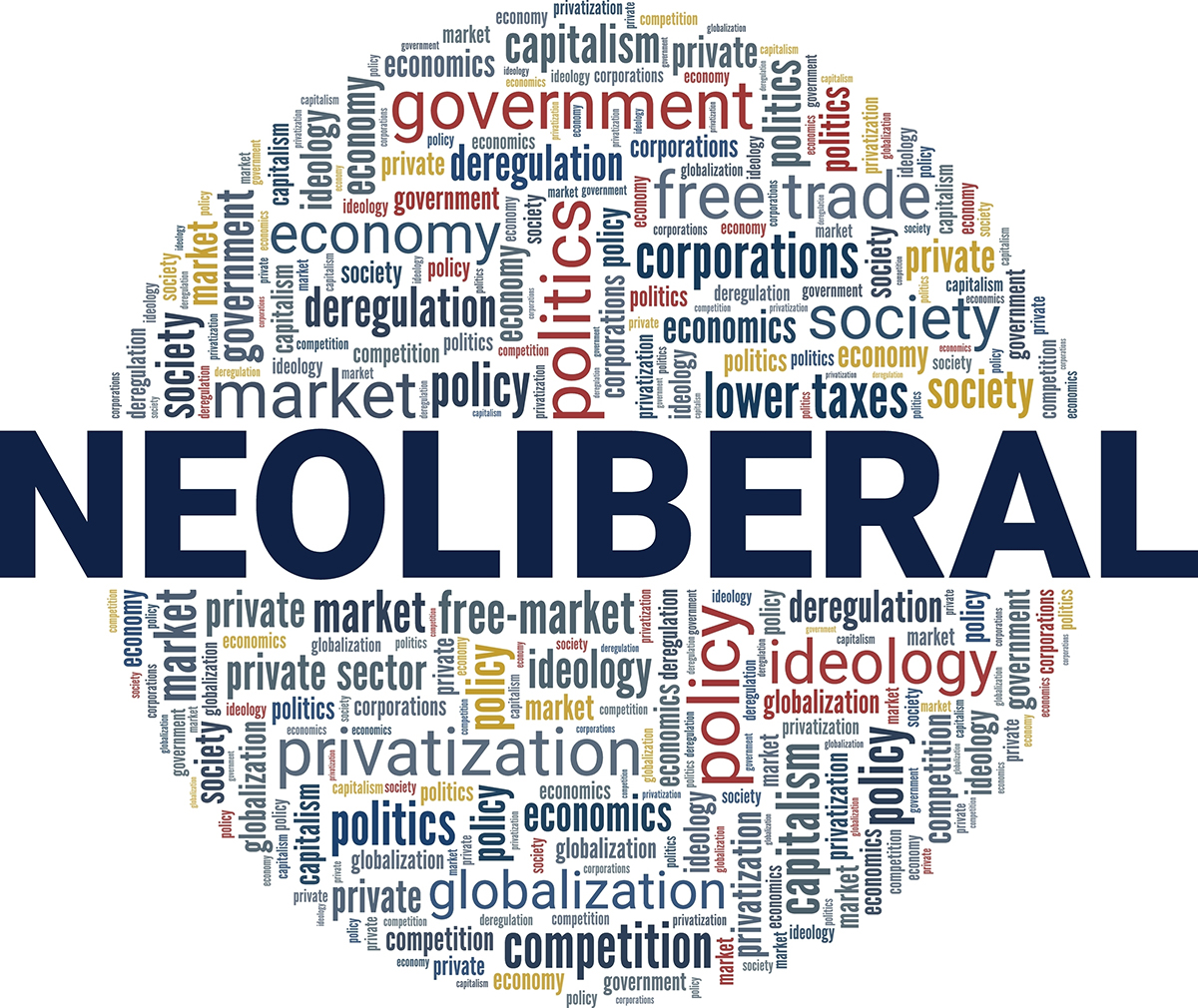At page 99 of their substance-free investigation into the effects of the doctrine they call “neoliberalism,” George Monbiot and Peter Hutchison start talking about “conspiracy fictions,” which is what they prefer to call conspiracy theories. They allege that part of the reason the common people have not recognized the evil that neoliberalism has done to them is that its proponents distract them with conspiracy fictions about woke extremists taking over the establishment, and so on. It’s their equivalent of Marx’s “opiate of the masses” or Juvenal’s panem et circenses. Yet the irony is that this entire work, whose full title is Invisible Doctrine: The Secret History of Neoliberalism, is a conspiracy theory in exactly the standard definition.
The entirety of Invisible Doctrine is devoted to the proposition that “they” (I’ll get to “them” in a minute) used a doctrine called neoliberalism to appropriate wealth and hide it from democratic government. They did this by erecting a Potemkin Village of academics and think tanks that seized democracy and misled the public to continue their thieving. Whoever “they” are varies—at some points they’re the top 1%; at others, specific corporate overlords. But whoever “they” are, they have managed to capture the entire world in their net. If this reminds you of some theories from the 1930s, you wouldn’t be far off.
But before they can advance their argument, Monbiot and Hutchison first must redefine capitalism. They cite the standard definition: an economic system based on private property that sets prices according to supply and demand, where profit incentivizes activity. They then reject that definition and instead redefine capitalism as:
an economic system founded on colonial looting. It operates on a constantly shifting and self-consuming frontier, on which both state and powerful private interests use their laws, backed by the threat of violence, to turn shared resources into exclusive private property, and to transform natural wealth, labor, and money into commodities that can be accumulated.
Property is not just theft—it’s looting, an act of violence. Without it, we would have a state of natural wealth. No incentives, presumably, are needed for mankind to progress, because progress itself is unnecessary (at least that seems to be the implication of the argument).
This definition ignores what Deirdre McCloskey used to call “the great fact” and now calls “the great enrichment”—the hockey-stick-shaped explosion of wealth for all mankind since the replacement of older systems by capitalism in the last few hundred years. In particular, Monbiot and Hutchison blatantly ignore the vast improvement of living standards among the world’s poorest in the last couple of decades.
They routinely assert that we live in a world where “the rich get richer and the poor get poorer” and that “the global South” is being wrecked, when the evidence is completely the other way round (except in places like Venezuela that are suffering from the ills of state socialism). Their evidence for the poor getting poorer is based on measures of inequality. For instance, at one point they claim that the lowest 50% in America are billions of dollars worse off than they were in the 1980s. However, this is based on wealth shares—in other words, if the lowest 50% still held the same share of wealth as they did then, they would hold, in aggregate, more wealth.
What that statistic hides is that the total amount of wealth held by the lower half has actually increased substantially in real terms. As with all matters of inequality, the question to ask is “How are the poor actually doing?”—and the indicators of wealth suggest that they are doing much better now, thank you very much.
This lack of serious questioning about what the authors of Invisible Doctrine are asserting infests the book. To be fair, it’s obviously intended as a polemic, but it fails the intellectual Turing Test (the idea that to understand what your intellectual opponents are saying, you must be able to state their arguments in terms they would recognize as fair). For instance, the late economist Steven Horwitz would make the argument that market competition is actually how we cooperate as a society. There is no acknowledgment in this book that arguments like this even exist, except in implication in the authors’ assertions that academic arguments are bought and paid for by “them.” There is certainly no attempt to treat such arguments fairly.
Such lack of intellectual curiosity extends to the authors’ treatment of history. For instance, they devote a good deal of space to what they say are the origins of capitalism on the island of Madeira in the 1400s. This is a great example, they think, because it illustrates the way in which capitalists looted colonial resources—industry on Madeira failed because its rulers used up all the resources there.
Yet most historians trace the origins of capitalism to the North Sea countries in the late 1600s, not to an island off Africa in the 1400s. The reasons should be obvious: Madeira was settled and exploited under the late feudal system, and the economic activities there were subject to the desires of the Portuguese crown, not any joint-stock companies. Monbiot and Hutchison say the cycle of “boom, bust, quit” repeated itself in Portuguese colonial exploits, moving from Madeira to Sao Tome to Brazil, with unfortunate consequences for the environment and for the enslaved labor. Yet Portuguese colonialism in the 15th and 16th centuries is surely not capitalism (nor do the authors spend any time on, for instance, Adam Smith’s discourses on the unproductive nature of slavery).
The absence of any potential challenges to their assertions also haunts their treatment of John Locke, whom they blame for the intellectual backing of the evil idea of private property. In particular, they point to his arguments on mixing labor with natural resources in the context of the Americas. Once this this theory was put into action, they suggest, all American land was stolen and exploited. Yet the authors fail to note the famous “Lockean proviso”—the principle that people may homestead unused land provided that “there was still enough, and as good, left; and more than the yet unprovided could use.” To be sure, many thinkers that Monbiot and Hutchison would call “neoliberal” reject the idea of the proviso, but Locke didn’t, and the authors don’t even acknowledge it exists.
Indeed, the term “neoliberal” itself is an example of the authors’ habit of treating questionable assertions as foundational facts. They claim that the initial cabal of “neoliberals” called themselves such and then erased the term from history. Indeed, there are sporadic examples of the use of the word from the 1930s to the 1950s, but a simple Google Ngram of the term reveals almost no usage at all until the 1990s, when it started to take off. As the economic historian Phil Magness has shown, such modern usage is almost entirely pejorative. In fact, very few people claimed to be neoliberal (at least until the U.K.’s Adam Smith Institute decided to owned the term, but that didn’t really take). This allows people of ill will to use it as they please, and this book is a fine example of that.
Invisible Doctrine’s discussion of loneliness is no better, as it fails to grapple seriously with the overlapping issues involved. The authors simply lay the blame for the modern fracturing of society and consequent rise in loneliness at the feet of the neoliberal system. Like many others, they tie this loneliness to “deaths of despair”—upsurges in deaths by suicide, drug overdose, and alcohol abuse. There are two big problems with this conclusion. The first (as Scott Winship of the American Enterprise Institute has shown): There have been only slight rises in suicide and alcohol-related deaths, and the main problem has been drug overdoses. This is a much more complicated story than “neoliberalism created the gig economy, which led to deaths of despair,” which is essentially a summary of the authors’ argument. There appears, for instance, to be a connection between falling church attendance and “deaths of despair,” but there isn’t enough space in this review to go into this question in detail.
The second big problem with how Invisible Doctrine handles the rise in loneliness is that it neglects to consider one very important factor: the decline of voluntary associations that promoted neighborliness and camaraderie, which were crowded out not by corporations but by government. Take as an example the demise of mutual aid societies and fraternal organizations. These were so prominent in the U.S. until fairly recently that I, as a child growing up in the U.K., was mystified by why Fred and Barney in the Flintstones would regularly wear funny hats. These organizations existed to provide an array of social services that members and their families and communities could enjoy, such as health insurance. The rise of the welfare state and the governmentalization of rules surrounding things like health insurance drove a bulldozer through these associations, until all that was left was empty ritual and perhaps the provision of an affordable watering hole. Indeed, certain corporations benefited, most notably the government-health complex, but the policies were pushed through by well-meaning men of the left.
That’s not to say that Monbiot and Hutchison don’t blame the modern left, too. They view Bill Clinton and Tony Blair with as much disdain as they do Ronald Reagan and Margaret Thatcher, perhaps holding them even more culpable for the supposed triumph of neoliberalism than the conservatives. The complete failure of communist, socialist, and social democratic regimes around the world doesn’t get much of an acknowledgement, however, as one of the reasons for the rise of Blairite “Third Way” thought (although there is a welcome admission that communism was as disastrous for the environment as they say neoliberalism is). This is probably in part because the logic of the authors’ definition of capitalism must lead them to the conclusion that social democratic Keynesianism merely offered an illusion of success, as it, too, was based on the “looting” of the Global South. The implication is that the end of the colonial era led to the collapse of traditional Western socialism, although they don’t formally acknowledge this.
This leaves a big hole in Monbiot and Hutchison’s thinking. At one point, they seem to suggest that their preferred state of a fairer society is represented in places like Scandinavia and South Korea, which have better social services. Yet to do so would require them to acknowledge that capitalism and a welfare state can coexist. Their definition simply doesn’t allow for this.
Their other example of a better society is America during the Second World War, believe it or not. They use it as evidence that state economic planning can work, and that people were happy to put up with things like rationing. Of course, in doing so they once again ignore inconvenient truths, like the existence of the black market, the provision of most of the arsenal of democracy by private corporations (see Arthur Herman’s fabulous history Freedom’s Forge), and the reliance on debt financing that saw America’s debt-to-GDP ratio at 113% at the war’s end (which was hastened by what I am sure they regard as war crimes at Hiroshima and Nagasaki). Despite Monbiot’s being British, the authors do not make similar postwar claims for the U.K., presumably because the British war effort was largely financed by “colonial looting,” and the war left Britain economically destitute at the end.
So what do Monbiot and Hutchison propose we do to shake off the shackles of neoliberalism? They say we need a different story, but fail to provide a new, persuasive story beyond “deliberative democracy” and a proposal to implement that story by means of a system that echoes Russian Soviets. Of course, we know how that story ends.
Yes, this review was written by a product of the neoliberal scam and published on a website that is also part of the scam, so it can be dismissed. I told you this was part of a conspiracy.

